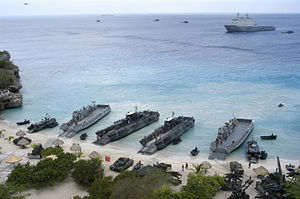
The Landing Craft Utility (LCU) is a type of boat used by amphibious forces to transport equipment and troops to the shore. They are capable of transporting tracked or wheeled vehicles and troops from amphibious assault ships to beachheads or piers.
The Engin de débarquement amphibie rapide (EDA-R) landing catamaran or L-CAT, entered service in January 2011. They can carry a main battle tank like other European LCUs but are capable of much higher speeds, up to 30 knots (56 km/h; 35 mph).
Germany has two Barbe-class utility landing craft (Type 520), dating from the mid-1960s, which remain in service under the SEK-M Naval Special Forces' command. Germany is looking to acquire more such crafts. Five Barbe landing crafts were transferred to Greece at the end of the Cold War.
India currently has six LCUs of the Mk III class and four LCUs of the Mk IV class.
The first Mk III class LCU was commissioned on 18 July 1986.
With the launch of the amphibious transport ship HNLMSÂ Rotterdam in 1998 there was a need for LCUs. The Dutch LCUs are similar to the British LCU Mk.10 with the bridge being set to one side allowing for a roll-on roll-off design. Until 2005 the Netherlands Marine Corps used the LCU Mark I (NL).